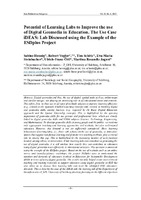Potential of Learning Labs to Improve the use of Digital Geomedia in Education. The Use Case iDEAS: Lab Discussed using the Example of the ESDplus Project

Megtekintés/
Metaadat
Teljes megjelenítés
Link a dokumentumra való hivatkozáshoz:
Gyűjtemény
Absztrakt
Digital geomedia and thus, the use of digital, spatial tools such as, online-maps
and satellite images, are playing an increasing role in all educational areas and contexts.
This refers, first, to their use in all types of (school) subjects to improve learning efficiency
(e.g., related to the Spatially Enabled Learning concept) and, second, to building digital
and geomedia skills, among learners (e.g., required by the Basic Digital Education
approach and the Spatial Citizenship concept). This is highlighted by the growing
importance of geomedia skills for our private and professional lives, which are closely
linked to digital geomedia skills and STEM subjects (Science, Technology, Engineering,
and Mathematics). To develop geomedia skills in young people and the public, we need not
only appropriate teaching and learning approaches and methods, but also well-trained
educators. However, this demand is not yet sufficiently considered. Here, learning
laboratories (learning labs), i.e., those with a focus on the use of geomedia, as innovative
spaces that support non-formal learning and promote new teaching methods, play a crucial
role in closing this gap. This is highlighted by the increasing number of such facilities
located, among others, at universities. While learning labs can contribute to promoting the
use of digital geomedia, it is still unclear how exactly they can contribute to educators
using digital geomedia more effectively in educational activities. This question is answered
using the example of the ESDplus project. Based on the use of methods such as an online
survey and transdisciplinary workshops, the project ESDplus aims to understand the
situation and demands of educators involved in Education for Sustainable Development
(ESD) in terms of using digital geomedia. The results not only helped create user-centered
teaching and training materials to support educators using digital geomedia in ESD but
also allow us to discuss how learning labs can meet the identified ESD educators’
demands. This is done by the case of the iDEAS:lab, the learning lab of the Department of
Geoinformatics-Z_GIS, University of Salzburg (Austria) focusing on the different objectives around education in terms of teaching and as well as educational research. The results
highlight the relevance of learning labs, to improve the use of digital geomedia in
education. This is because of its flexible and open setting to combine analog methods and
digital geomedia, the provision of learning activities for young people and training
initiatives for (future) educators, and the building of communities of people interested in
using digital geomedia in education. This also includes research activities around
education and capacity building.
- Cím és alcím
- Potential of Learning Labs to Improve the use of Digital Geomedia in Education. The Use Case iDEAS: Lab Discussed using the Example of the ESDplus Project
- Szerző
- Hennig, Sabine
- Vogler, Robert
- Schötz, Tim
- Steinbacher, Eva Maria
- Öttl, Ulrich Franz
- Jagust, Martina Rosandic
- Megjelenés ideje
- 2025
- Hozzáférés szintje
- Open access
- ISSN, e-ISSN
- 1785-8860
- Nyelv
- en
- Terjedelem
- 22 p.
- Tárgyszó
- geomedia, non-formal education, education for sustainable development, geoinformatics
- Változat
- Kiadói változat
- Egyéb azonosítók
- DOI: 10.12700/APH.22.8.2025.8.2
- A cikket/könyvrészletet tartalmazó dokumentum címe
- Acta Polytechnica Hungarica
- A forrás folyóirat éve
- 2025
- A forrás folyóirat évfolyama
- 22. évf.
- A forrás folyóirat száma
- 8. sz.
- Műfaj
- Tudományos cikk
- Tudományterület
- Természettudományok - matematika- és számítástudományok
- Egyetem
- Óbudai Egyetem
